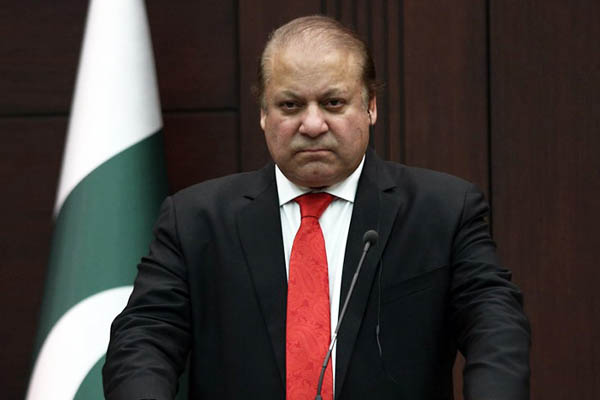
File Photo. Adem Altan—AFP
Judgment in case that may oust Prime Minister Nawaz Sharif had been reserved in March
The Supreme Court is set to determine the prime minister’s fate on Thursday with a ruling on corruption allegations that could see him ousted from power after the Panama Papers linked his family to offshore businesses.
The highly-anticipated decision threatens to plunge Nawaz Sharif’s governing party into turmoil ahead of general elections which must be held by next year, and as security and the economy improve in the militancy-plagued country.
The controversy erupted with the publication of the so-called Panama Papers last year, 11.5 million secret documents from Panamanian law firm Mossack Fonseca that documented the offshore dealings of many of the world’s rich and powerful. Among the global elite implicated were three of Sharif’s four children—his daughter and presumptive political heir Maryam, and his sons Hasan and Hussein.
At the heart of the matter is the legitimacy of the funds used by the Sharif family to purchase several high-end London properties via offshore companies. Sharif’s ruling PMLN party insists the wealth was acquired legally through family businesses in Pakistan and the Gulf. But lawyers for cricketer-turned-politician Imran Khan, leader of the Pakistan Tehreek-e-Insaaf party, argue the paper trail for the funds is nonexistent, and say the onus is on Sharif to prove his relatives did not engage in money laundering.
The case has dominated headlines in Pakistan for the better part of a year, though many observers believe the court would be reluctant to directly oust Sharif. It has repeatedly emphasized it is not conducting a criminal trial, while PMLN lawmakers told AFP that Sharif himself had not been named in the Panama Papers.
“We are hopeful the decision will come according to the law of the country, not on expectations of the opposition,” provincial PMLN lawmaker Hina Butt said.
The court has taken such action before, however, holding Prime Minister Yousaf Raza Gilani in contempt in 2012 for refusing to re-open corruption investigations into then President Asif Ali Zardari, resulting in his disqualification. But the five-member bench could also direct law enforcement agencies to carry out more detailed investigations into the allegations against Sharif, verbally censure him or his children, or clear him entirely.
“The nation is expecting some sort of judgment which will change the course of history in Pakistan,” senior Supreme Court lawyer S.M. Zafar told AFP, though he said it was difficult to predict the verdict. Regardless of the outcome, he said, the case is important for Pakistan, which ranked a lowly 116th place out of 176 countries in a corruption perceptions index released by Transparency International in January.
Political analyst Rasul Buksh Rais said: “It’s going to be [a] historic decision that will push Pakistan into electoral mood in either case,” adding that he did not expect disqualification. He said a new judicial commission could be in the offing, which would allow Khan to claim moral victory for exposing corruption.
PMLN and PTI lawmakers reaffirmed to AFP late Wednesday that they would accept the court’s decision.
The controversy is the latest to hit Sharif, an industrialist serving his third term as prime minister after the first two were interrupted by interventions from the country’s military. Late Wednesday he detailed his party’s infrastructure achievements in televised comments at the inauguration of a power plant, without mentioning the looming verdict.
If Sharif is ousted, the PMLN can select a new prime minister from within the party, though there may be political pressure for fresh polls.
Pakistan, which marks its 70th anniversary of independence later this year, has seen a surge in optimism in recent months. Security has dramatically improved in the last two years, overall confidence in the economy is growing, and the military, which has ruled the country for more than half its history, appears to have reached an accommodation with Sharif’s civilian government.
